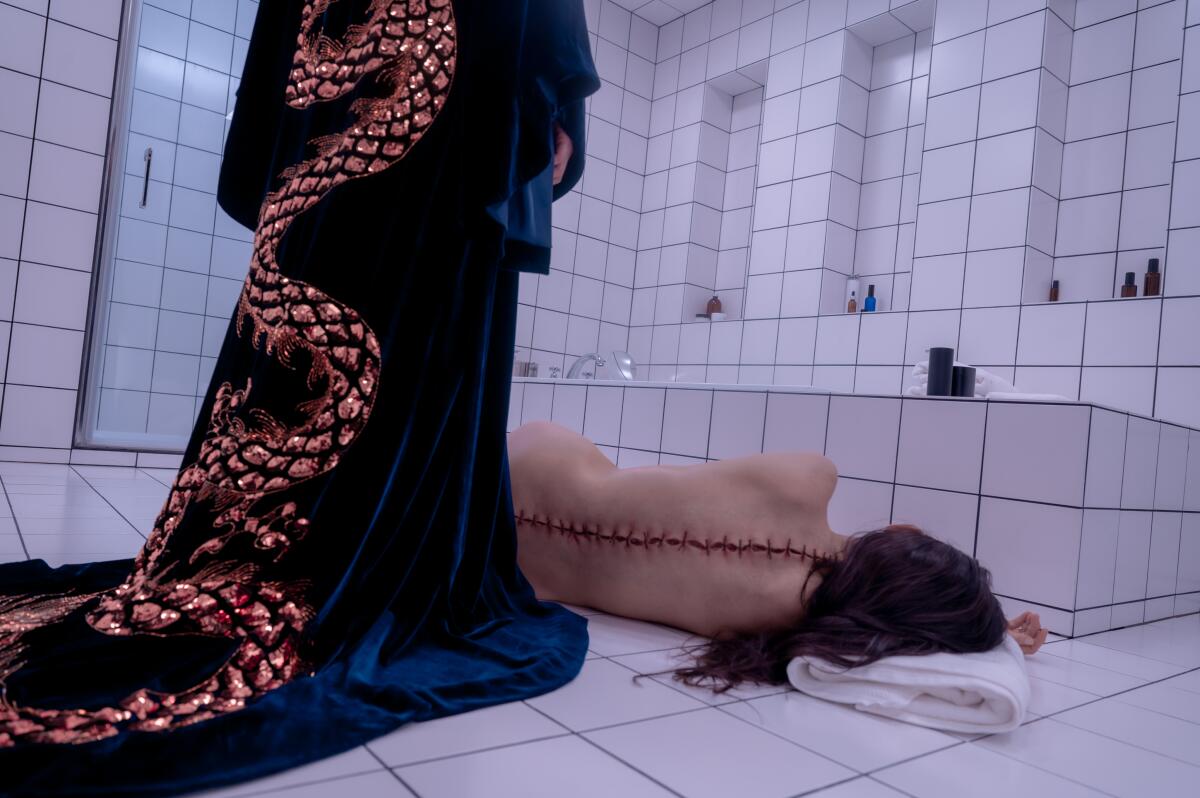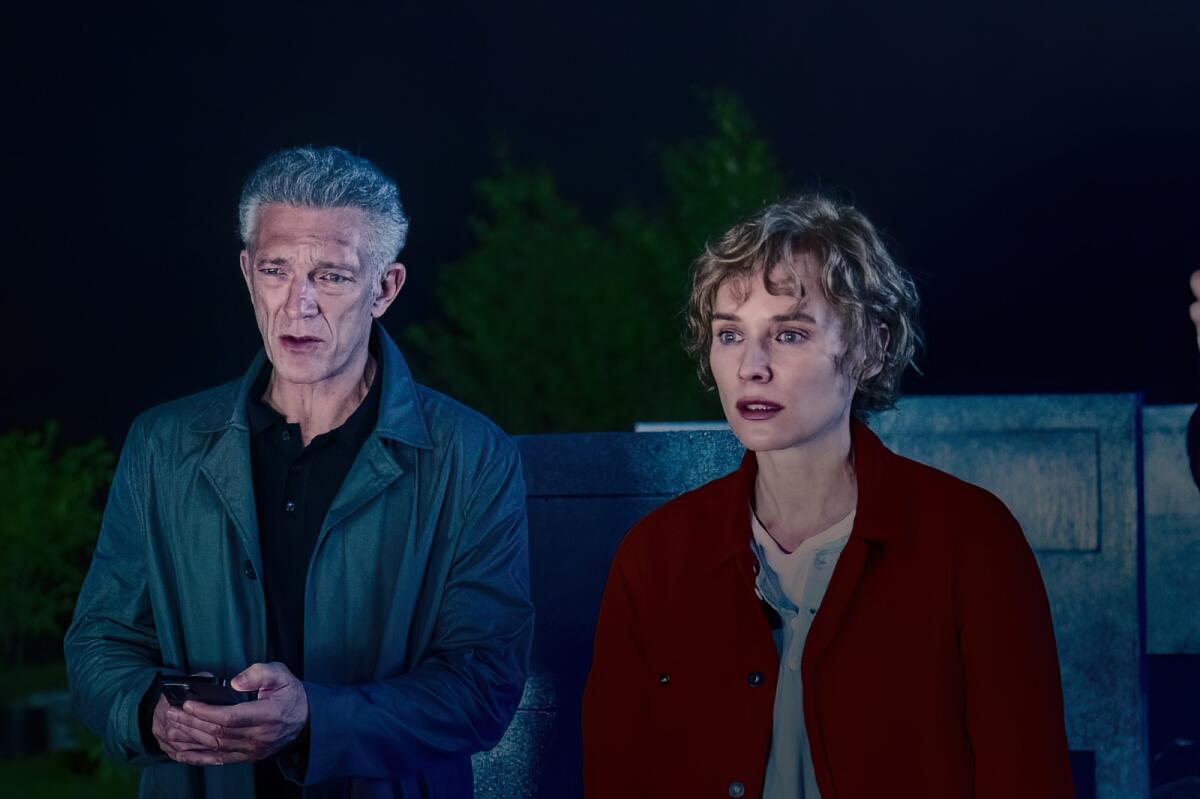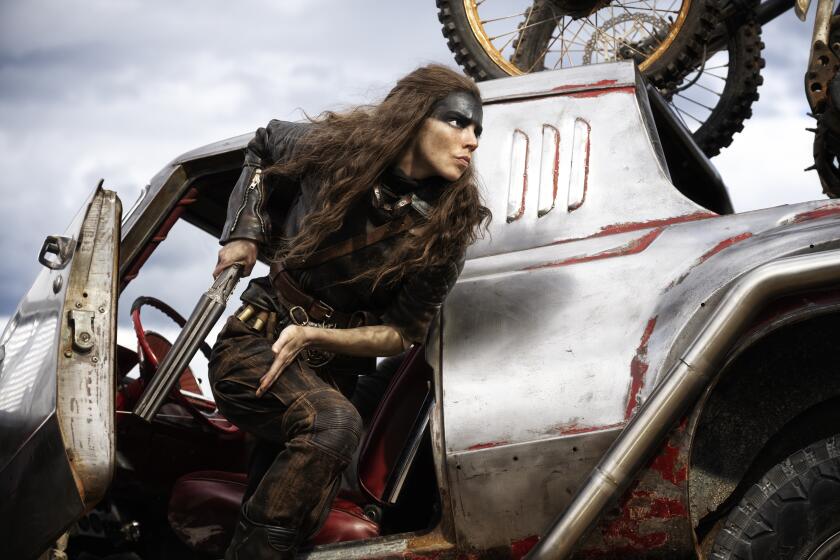In hypnotically trashy Trump biopic and other showstoppers, Cannes goes under the knife

- Share via
CANNES, France — No monster shambles into being fully formed. They’re made, sometimes lovingly tended to, by our own worst impulses.
Shrewdly, “The Apprentice,” a hypnotically trashy biopic detailing Donald Trump’s rise to prominence in the ratty, Koch-era New York of the 1970s and ’80s, requires no sympathy for the future president. That’s a good thing, because this Trump — already a schlump with rage issues played by Sebastian Stan with jowly prosthetics — is, if not quite the worst of all Trumps, still a pretty awful one. He’s the heartless rent collector who goes door to door in his father’s Brooklyn slum buildings, dodging pots of boiling water flung by tenants. He’s the Trump who elbows his way in line to scarf down cheeseballs at an Atlantic City casino buffet. He’s just getting started.
By some fitting cosmic logic, though, in order to summon this creature into being, the movie’s director, Ali Abbasi, had to find someone even more horrible to love. He has him in Roy Cohn, the noxious Republican lawyer who watered the seeds of Trump’s ambition when the young developer needed affection (and a little political grease). Jeremy Strong, who as Kendall Roy on “Succession” turned ethics-free tooldom into poetry, finds his Cohn in verbal tics and locked-jaw fixity. Amazingly, it’s the definitive one, even after the many takes on Cohn in “Angels in America,” “Fellow Travelers” and elsewhere.
In expanding the story of Furiosa (Anya Taylor-Joy), director George Miller still creates entertaining, pounding action — but loses the forward momentum on which the franchise is based.
Shuddering with degraded VHS noise, “The Apprentice” has fun in its evocation of a junky real estate empire snapping into place, as debt-doomed hotels rise and gaudy interiors are recarpeted by Ivana Trump (another preternaturally self-possessed turn by the Oscar-nominated Maria Bakalova of “Borat Subsequent Moviefilm”). But Strong is the one who finds an unlikely frequency — tragedy? — for what might have been an “SNL” skit, as Cohn’s roar dims with AIDS-related illness. There’s the tiniest glint of guilt in his eyes as his protégé replaces him, one-upping him with a shamelessness that we still haven’t seen the depths of.
On Monday, “The Apprentice” bowed in competition at a Cannes Film Festival that had finally found its appetite. Dark, chomping movies consumed patio discussions and online chatter as ceremonial cows like Kevin Costner’s fuzzy three-hour western, the first part of “Horizon,” quickly sank into irrelevance. You could fixate on the nightmarish sight of a tube liposuctioning fat from Trump’s distended stomach (we also see his balding scalp being stapled shut) or, conversely, you could settle in for the new Demi Moore comedy, which, as unlikely as it sounds, eclipsed even “The Apprentice” for sick thrills with a bitter aftertaste.

“The Substance” was easily the most Hollywood-centric movie at the fest, but don’t fool yourself into thinking it’s only about show people. The universality creeps up on you. Darkening palm trees sway as Elisabeth Sparkle (Moore), once an Oscar-winning A-lister with a Walk of Fame star, finds herself booted from her aerobics show. “At 50, it stops,” says her callous producer (a riotous Dennis Quaid) during a goodbye lunch in between mouthfuls of shrimp. It’s a terrifyingly ravenous film.
Who will be the next Sparkle? Certainly no one over 30, insists a want ad. Melting down in her Norma Desmond-like solitude, Elisabeth won’t have it. She chases a tip down a dark alley, leading to a spotless lab where her numbered locker yields tubes of white gunk, syringes of green miracle formula and some easy-to-read instructions. A new Elisabeth, dewy and supple, will spring fully developed from her back. All she has to do is share her awake time with it on an alternating weekly basis.
Once Margaret Qualley enters the picture, writhing in her regained potency, christening herself Sue and nabbing Elisabeth’s exercise TV gig within days, “The Substance” becomes a frighteningly confident piece of anxiety. French writer-director Coralie Fargeat, last of 2017’s Time’s Up thriller “Revenge,” caresses their bodies in close-up — both actors are fearless, liberated by career-best turns — and you’ll catch yourself thinking: How is this even remotely OK? (Keep Brian De Palma on a watch list after he sees this one; he may start looking for a Substance lab himself.)
But Fargeat knows what she’s doing. Chasing down a comment on male-imposed expectations — and, more subtly, self-imposed ones — her macro lens swaddles everything in consumable lushness. Or at least it does for a while. As you may have guessed, sharing alive time proves difficult (that’s all that should be broached) and the artistry of “The Substance” makes a necessary shift toward the tactile makeup work of Pierre-Olivier Persin, who almost singlehandedly delivers the most astonishing climax of the year.

Does a festival like this even need a new David Cronenberg movie? (The goo master’s 1986 “The Fly” was much name-checked by viewers stumbling out of “The Substance.”) It got one. “The Shrouds” is the director’s somber attempt to process the 2017 death of his wife of nearly 40 years, and because this is Cronenberg doing the processing, that comes in the form of a widower tech inventor, Karsh (Vincent Cassel), who manufactures ominous-looking coffins with radioactive-triggered cameras mounted inside so the bereaved can watch a beloved spouse’s body decompose in real time from any angle.
Cronenberg knows to expect a flinch. Don’t hold it back. He even dramatizes it in an early (and funny) scene, Cassel’s severe-looking loner suffering through a first date that quickly goes south. But apart from being misunderstood, what does the life of a “corpse voyeur” entail? In its chilly, Howard Shore-scored way, “The Shrouds” develops into a mystery, as activists vandalize the gravesite and Karsh enlists his hacker brother-in-law, Maury (Guy Pearce), to investigate.
As far back as 1983’s “Videodrome,” Cronenberg’s films have flirted with a hint of the overly theoretical: Characters play like ideas; scenarios like graduate theses; and Canadian office buildings resemble ominous experimentation sites. (Sometimes that’s exactly what they are.) We’re lucky to get movies so rich with ideas and mood, but “The Shrouds” suffers from its own headiness.
But then, almost magically, German actor Diane Kruger shows up in three incarnations, each one a complex mystery, and you understand why the filmmaker needed to express this. She’s the twin sister of Karsh’s dead wife, mourning in her own way (and grooming dogs). Then she’s his digital assistant, an AI named Hunny, who keeps him company. Finally, in his dreams, she is the lost Becca, returning to him in bed, each time her body more diminished by her spreading cancer. These are ghostly, arresting images, as emotional as anything Cronenberg has done.
Bodies tell stories. And Cannes was listening, no matter how difficult.
More to Read
Only good movies
Get the Indie Focus newsletter, Mark Olsen's weekly guide to the world of cinema.
You may occasionally receive promotional content from the Los Angeles Times.












